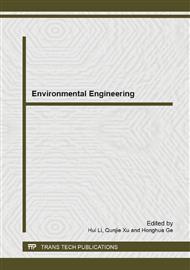p.2136
p.2139
p.2145
p.2152
p.2156
p.2163
p.2167
p.2171
p.2175
Environmental Evaluation of Different Heating Systems
Abstract:
This study compares environmental impact of different heating systems with life cycle analysis, and get out if heat pump system has advantage in replacing boiler heating systems. Systems energy use are compared in one-year operation phase for residential buildings located in Tianjin city, including waste water heat pump system, coal boiler system and gas boiler system. In order to analyzed the environment performance of heat pump system in different conditions. The power structure impact to heat pump systems is analyzed using life cycle analysis method. The results indicate that with COP=4, even if 100% coal power is used, heat pump has advantage in the most impact factors, and if more clean power is used, the environment impact in heat pump system will be reduced obviously. The result also shows that waste water use in heat pump system impact the result little for its small quantity. Nomenclature GW, Global Warming; NRC: Non-renewable Resource Consumption; OD: Ozone Depletion; ACI, Acidification; EUT, Eutrophication; SPO, Synthesis of photochemical ozone; SW, Solid Waste; HW, Hazardous Waste; SD, Smoke and Dust. RC: Renewable Resource Consumption
Info:
Periodical:
Pages:
2156-2160
Citation:
Online since:
December 2013
Authors:
Price:
Сopyright:
© 2014 Trans Tech Publications Ltd. All Rights Reserved
Share:
Citation:


